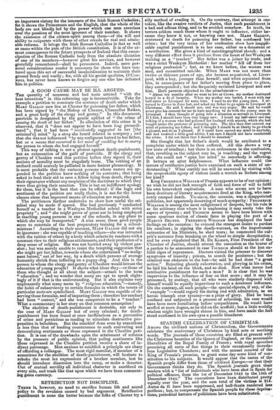RETRIBUTION NOT DISCIPLINE.
MYRRH is, however, no need to sacrifice human life and sound policy to the revulsion caused by bad argument. Retributive punishment is none the better because the folks of Chester try a
silly method of evading it. On the contrary, that attempt is one token, like the evasive verdicts of Juries, that such punishment is a bad and odious thing, and to be avoided somehow. In truth, its terrors seldom reach those whom it ought to influence, either be- cause they know it not, or knowing care not. MARY Gax.eor, sentenced to death for poisoning her father, has confessed her crime ; but the very terms of her confession show how ivappli- cable capital punishment is to her case, either as a deterrent or a retribution. She gives a kind of autobiographical sketch : and a very different effect does it produce from the boast of her Wesleyan training as a "teacher." Her father was a joiner by trade, and was a strict Wesleyan Methodist : her mother "fell off from her religious profession"; but, as we knew before, the woman was mad, and committed suicide. When Meer was not more than twelve or thirteen years of age, she became acquainted, at Liver- pool, with a boy, younger than herself; and when separated from him, in consequence of her father's moving from place to place, they corresponded ; but she frequently revisited Liverpool and saw him. Both parents objected to the attachment-
" About ten months after we went to live at Crewe, my mother destroyed herself in a fit of insanity. When my mother was buried, I went with my half-sister to Liverpool for some time. I used to see the young man. I re- turned to Crewe in June last, and asked my father to go again to Liverpool at Christmas. He said I should not, and was very angry. He said he would never give his consent for me to have anything to do with the young man in Liverpool. I then thought of going into a situation as servant in Liverpool. If I had, I should have been very happy now. I heard my half-sister one day talking of a woman who had poisoned her husband with arsenic, which she had bought under the pretence of poisoning rats. The idea then first entered my mind of poisoning my father; and I thought I should be at liberty to go where I pleased, and do as I pleased. If I could have opened my mind to anybody, and had received a little good advice, I am sure I should not have committal the crime. I did not think that I should be detected."
She thought that her father's death would be attributed to a complaint under which he then suffered. All this shows a very low state of intellect; but there is an artlessness in the confession, that, revolting as the subject may be, is touching; and the regret that she could not "open her mind" to somebody is affecting. It betrays an utter helplessness. What influence could the terrors of retributivejustice have exercised on such a state of un- derstanding ? What earthly use will be answered by visiting with the unspeakable agony of violent death a wretch so forlorn among her kind?
King FREDERICK WILLIAM of Prussia appears to be of our opinion: we wish be did not lack strength of faith and force of will to fulfil his own benevolent aspirations. A man who seems not to have been destitute of literary acquirements fired at the King, who nar- rowly escaped death. TsceEce, the assassin, was a disappointed politician, not apparently deserving of much sympathy : FREDERICK WILLIAM is among the most enlightened of despots, but his rule is so far arbitrary that where it is unpleasing it may easily take the aspect of tyranny ; and TSCHECII seems to have been bitten with some spurious notion of classic fame in playing the part of a MARCUS BRUTUS. FREDERICK WILLIAM has displayed the best feelings on the occasion : he evinced the strongest desire to pardon his assailant ; in signing the death-warrant, on the importunate entreaties of his Ministers, he shed tears ; he commuted the cul- prit's sentence from breaking on the wheel to simple decapitation ; and he even stipulated that M. DE Kamer, First President of the Chamber of Justice, should attend the execution as the bearer of a pardon to be announced in case TSCUECII should at the last ex- hibit signs of repentance. Doctors visited the prisoner to discoger symptoms of insanity ; priests, to search for penitence ; but the criminal was obdurate to the last—be said he had done "a greet action." Rejecting ghostly exhortation, and glorying in his crime, he laid his head on the block, and so died. Now what terror had retributive punishment for such a man? It is clear that he was impervious to the influence of fear on that score ; and it may be presumed, by analogy, that all who were similarly disposed with himself would be equally impervious to such a deterrent influence. On the contrary, all such people—the special objects, if any, of the "example "—would regard his daring end with admiration, as an heroic triumph over tyranny—as a prize of glory. Had he beau confined and subjected to a process of schooling, has case would have been more humiliating before sympathizers. He would have scoffed at mere dogma, as he did on the scaffold; but a little worldly wisdom might have wrought shame in him, and have made the feel stand confessed in his own eyes a puerile blunderer.






















 Previous page
Previous page